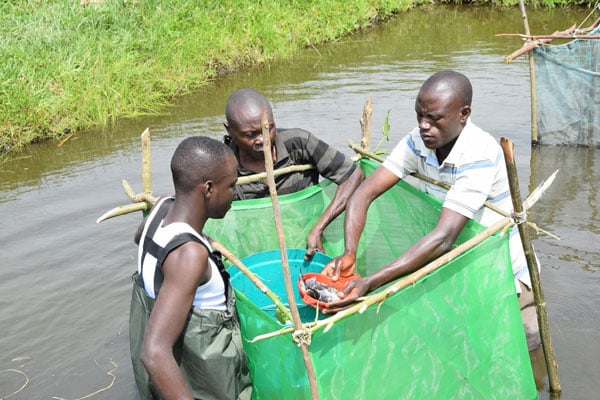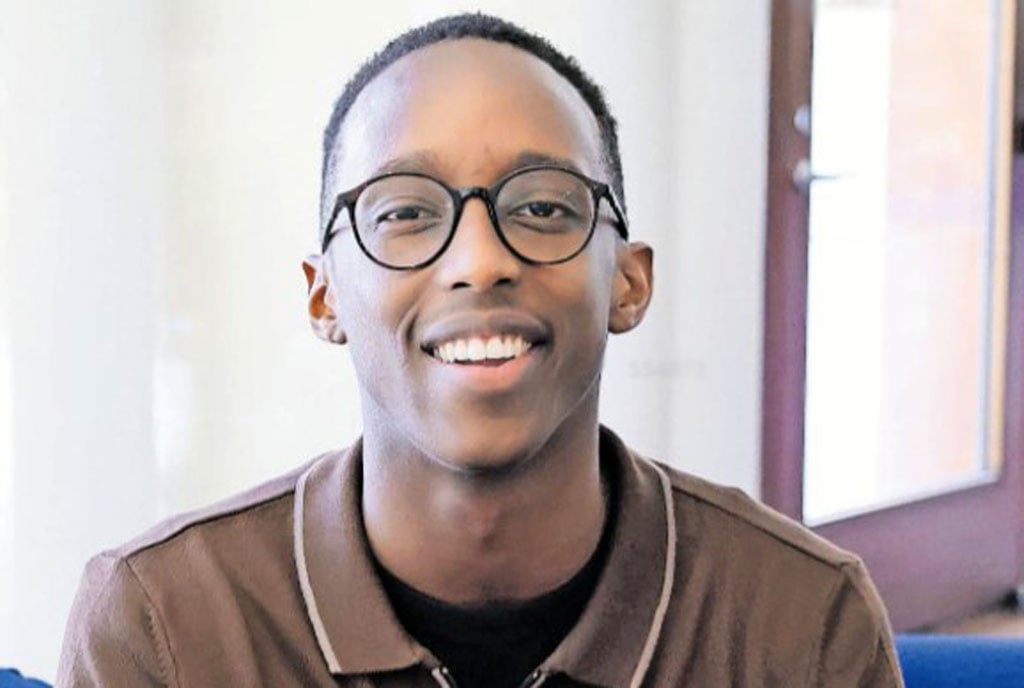Prime
Seeds of gold farm clinic: Trainers ready to tech farmers new skills

An agronomist (right) explains to farmers how to keep fish using the hapa technology. The trainers will this morning equip farmers with this technology. PHOTO/GEORGE KATONGOLE
What you need to know:
- As in the past, there will be dozens of experts at the clinic to answer all your burning questions.
The Seeds of Gold Farm Clinic, a favourite for keen farmers, is taking place today at Rwebitaba Zonal Agricultural Research and Development Institute (ZARDI) in a virtual format.
The one-day event highlights the key activities at Rwebitaba such as aquaculture, apiculture, Irish potatoes, tea and beans.
Rwebitaba-ZARDI is a Naro institute covering mid-western Uganda implementing projects in agricultural research, dissemination and training services covering Kamwenge, Kabarole, Kyegegwa, Ntoroko, Bundibugyo, Kyenjojo, Kasese and Bunyangabu districts.
The Seeds of Gold farm clinics have become a forum where experts and farmers meet and share information and the most pressing problems facing the agriculture industry.
The initiatives have been steadily gaining traction, attracting farmers and agribusiness enthusiasts from all corners of the country, proving to be indeed a one-stop shop where the country’s key food producers, majority who are smallholder farmers, actively interact with experts.
The events are usually segmented into trainings, question and answer sessions, one-on-one interactions between experts and farmers and demonstrations.
At today’s Farm Clinic, experts from the participating organisations will educate, inform, teach and nourish farmers’ hunger and quest for knowledge on cushioning themselves from these conditions that impede their optimal agricultural productivity, among others.
“This Farm Clinic comes against the backdrop of a myriad of challenges that farmers contend with. These include crops and livestock diseases and as well as challenges posed by climate changes. These, have made the need for accurate information an urgency, which the Farm Clinics seek to address to the farmers’ satisfaction,” says Elizabeth Namaganda Nation Media Group, Uganda head of marketing.
Institute director Dr Robooni Tumuhimbise says the Farm Clinic is an excellent event to raise awareness about the great opportunities available in Naro’s research in order to equip farmers with knowledge on agribusiness and value addition.
Dr Tumuhimbise says the institute will carry out training for four more commodities including bee keeping. Others are beans, dairy, fish and tea.
The institute has a national mandate on tea research in Uganda and is home to Uganda’s sole tea gene bank.
He says the institute has produced several products from tea including tea oil, and green tea powder and beverage all of which will be showcased at the Farm Clinic this morning.
Towards agri-led growth
Rwebitaba is pursuing an aggressive growth agenda and agriculture is at the centre of this. The province not only provides food and nutrition but also supplies the raw material for the agriculture-based industry to cater for the domestic market and also generate goods for exports.
The Agri-led programme, which is a transformative Presidential Initiative, is an innovative approach to realising people’s aspirations at the local level by focusing on local evidence and prioritising value-chains based on natural resources.
The Agri-led initiative in the Rwenzori region is a joint effort by Operation Wealth Creation (OWC), Uganda Investment Authority (UIA) and the National Planning Authority (NPA), with whom Rwebitaba has collaborated to demonstrate the investment potential of the Rwenzori region in agriculture.
The institute continues to profile agro-based investment businesses for support implementation.
Rwebitaba is committed to following the best practices including the involvement of the private sector in their sustainable development plans.
Stingless honey bees
One of the enterprises that will feature on the day is the domestication of rare kind of bees that are stingless, locally known as obuhura and whose products are more nutritious compared to the normal honey bees that are reared.
According to Ronald Mugume, the apiculture (beekeeping) technician at the institute, rearing stingless bees is a less taxing and more rewarding venture.
Mugume says honey from stingless bees fetches a higher price on the market because of its increased nutritious value. He notes that rearing stingless bees guarantees harvesting honey three times in a year with a hive giving at least 12 litres annually.
The ‘hapa’ method
For farmers interested in fish production, it is important to consider using properly produced fingerlings. They therefore need to invest in low cost hapa-based hatcheries in order to increase harvests.
At Rwebitaba, they have adopted the use of hapas (net enclosures) placed in ponds. A hapa is a cage-like, rectangular or square net impoundment placed in a pond for holding fish for various purposes. They are made of fine mesh netting material. The mesh size is such that the fry or fish inside cannot escape.
Other ventures
The institute will also take farmers through resilient bean production including Naro Bean 1-4.
The trainer, Douglas Jjemba, will highlight management practices that can increase profitability.
The institute will showcase products that have been produced from tea including green tea and a ready to drink green tea beverage.
This is the reason why the government invested more resources into research on high yielding and drought-resistant varieties to boost tea production.
Experts will also train farmers on dairy feeding issues using the various pastures available on the market.
Trainers
Dr Robooni Tumuhimbise
Dr Robooni Tumuhimbise is currently a director of research at the National Agricultural Research Organisation (Naro), Rwebitaba Zonal Agricultural Research and Development Institute, Uganda. He is a result -oriented crop scientist with 15 years’ experience in agricultural research and development, working on RTB crops, especially cassava, cocoyam, banana, and tea.
After completing his PhD in Plant Breeding from the University of KwaZulu-Natal, South Africa, where his research was on cassava breeding for early storage root yield and resistance to viral diseases, he joined the National Banana Programme of Naro, Uganda as a banana breeder. As a banana breeder, he successfully led a research team of more than 100 people that released five superior cooking banana varieties currently being promoted in East Africa. He has co-supervised more than 15 postgraduate students and published more than 40 articles in peer-reviewed journals.
David Mununuzi - Aquaculture technologist
Aquaculture/fisheries technologist. Mununuzi has special emphasis on fish farming, fish biology and dynamics, fish stock assessment and economics.
He will focus on low cost breeding techniques for fish using hapas (nets) for profitable fish operations.
Ronald Kawooya - Head of tea research
Ronald Kawooya is the head of tea research and development programme at Rwebitaba ZARDI. He is an agronomist and crop seed systems expert with 10 years of experience applying agricultural value chain development in research and with farmers in improving their livelihoods. His work is focused on improving agricultural crop production and productivity through researching, demonstrating and training different stakeholders including farmers on good agricultural practices. In addition, he also focuses on cropping patterns, farming systems, soil fertility management (fertiliser and organic material), plant protection (weed, pest and disease management), post-harvest handling of crop produce and value addition of agricultural crop commodities. Administratively he is tasked with the responsibility of coordinating the implementation of research activities within the tea programme through developing, leading and mentoring a research team that can deliver the programme mandates; providing professional, technical and administrative leadership to all scientists and other staff of the programme.
Today
Seeds of Gold Farm Clinic at Rwebitaba ZARDI
Enterprises: Aquaculture, apiculture, Irish potatoes, tea and beans
Location: Rwebitaba ZARDI
Live on NTV from 4-6:00pm
Scheduled Farm Clinics
Nov. 13: Namulonge (Dairy)
Dec. 4: Mayuge (Cassava, maize, pastures, coffee and rice)
SPONSORS
The event, which will be relayed on all NMG-Uganda platforms is held in partnership with National Agricultural Research Organisation (Naro), Stanbic Bank, Bank of Uganda, Zoetis and NSSF, among others.
THEME
Its theme will be climate-smart farming, with the ongoing effects of climate change, invasion by persistent pests and diseases, and lack of proper agricultural and farming input and information. The Seeds of Gold Farm Clinics continue to help the farmers navigate these challenging times.




